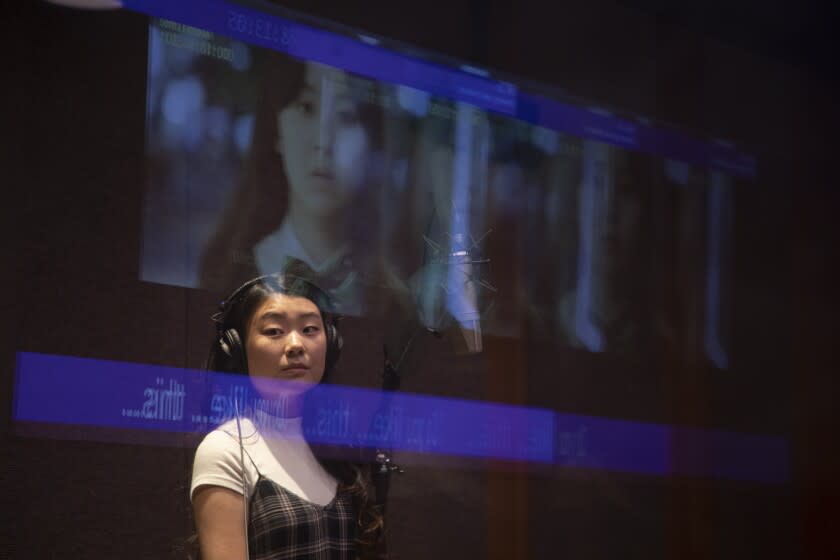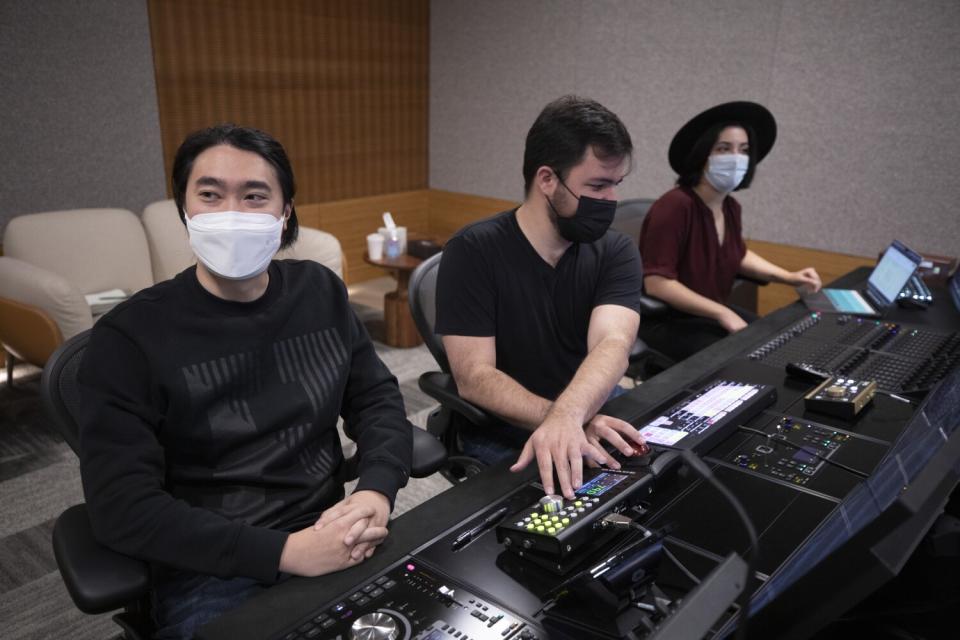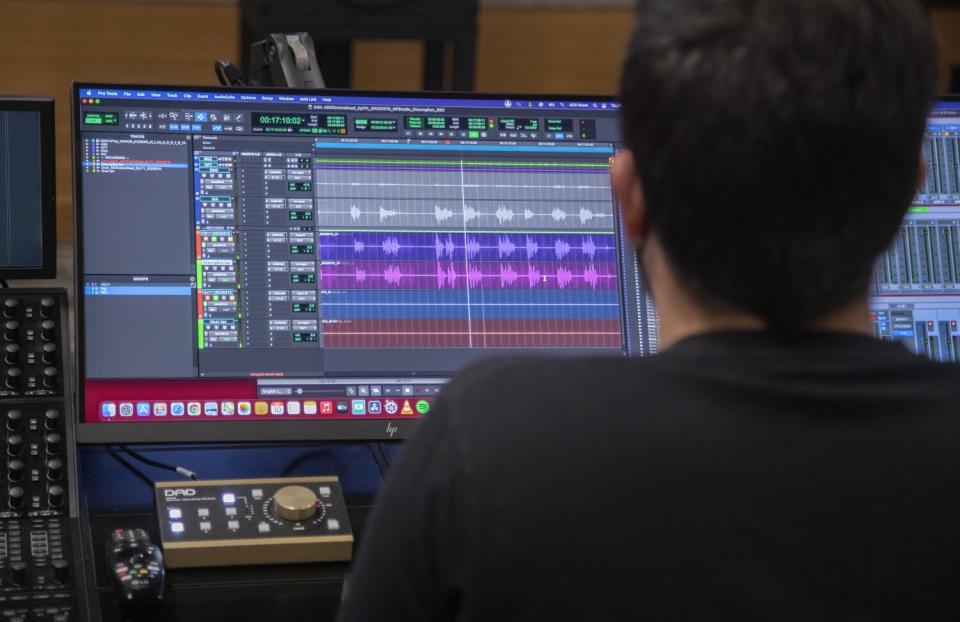Why dubbing has become more crucial to Netflix's business

- Oops!Something went wrong.Please try again later.
No one said dubbing a Korean zombie series would be easy.
Inside a Netflix recording studio off Sunset Boulevard, director Kyung Sok Kim, associate producer Anastasia Barbato and engineer Yoav Litman scanned a big screen as they replayed a scene from an episode of "All of Us Are Dead." They subbed in audio from an English recording made by two voice actors in a sound booth nearby.
The trio carefully watched to be sure the English words matched the mouths of the Korean actors and the performance was authentic to the script.
One English line stumped them: "Let's eat, take a bath, and then we can talk."
Kim, who is from Seoul, thought the word "bath" wasn't true to the Korean word in the original script, which refers to a sauna.
"It's more of a Korean thing when they go to like [the] sauna," Kim said. "It's a Korean spa."
"Take a shower — would that work?" Barbato asked.
"I think it's a little different," Kim said. "It's more specifically talking about Korean spa."
Kim changed the line to "spa" and instructed the voice actors to show a little more emotion.
"Let's go for another take," Kim said over an intercom. "You ready?"
Getting the translation right has become more crucial than ever for Netflix. Confronted with rising competition and slowing subscriber growth, the Los Gatos, Calif., company has invested heavily in foreign-language programming to cater to an increasingly global audience spanning 222 million subscribers.
Consider "All of Us Are Dead," which debuted on Jan. 28 and has since reached the top 10 in 89 countries, including the U.S. The series, about a group of high school students dealing with a zombie virus outbreak, has been dubbed in 14 languages.
"At Netflix, we believe that great stories are universal," said Kathy Rokni, director of globalization. "They travel, they connect people, and that is the driver for us ... wanting to not make language a barrier and in fact make it an asset to connect those stories and those emotional moments."
Last year, Netflix dubbed 5 million minutes of programming and subtitled 7 million minutes. Consumption of dubbed programming increased 120% from 2020 to 2021, the company said.
Driving much of the growth has been the surging popularity of Korean and other foreign-language dramas. Hollywood interest in Korean content reached new levels when "Parasite" won best picture at the Academy Awards in 2020.
Netflix's most popular series to date is the Korean-language dystopian series "Squid Game," which attracted 1.65 billion viewing hours in its first 28 days.
And dubbing has played a key role in drawing more viewers. On Netflix, more people chose to watch "Squid Game" dubbed over the version voiced by its original cast in Korean. Plans are underway for a second season.


Consumption of Korean content on Netflix increased sixfold from 2019 to 2021, and the streamer plans to release at least 25 Korean-language titles this year, up from 15 last year.
"The K-drama market has always had little pockets of success all over the place, but I think the ease of delivery that we've offered has kind of pushed that into the mainstream," Ted Sarandos, Netflix co-chief executive and chief content officer, told analysts last month.
As Netflix pushes to expand international programming, dubbing helps make more shows and films accessible to viewers who do not like to, or can't, read subtitles.
"To maximize content, you have to take content that's in one language and make it accessible to all languages," said Maribel Lopez, founder of Lopez Research, a Mount Pleasant, S.C.-based consulting and market research firm. "It's a very smart strategy."
"All of Us Are Dead" was dubbed in languages including English, French, Spanish and German, and subtitled in 31 languages. The series can be watched a variety of ways and most viewers prefer to watch it dubbed.
Netflix began dubbing shows in 2015, back when it was primarily licensing films and TV shows.
Today, Netflix provides subtitles in as many as 37 languages and dubs up to 34 languages. The dubbing and subtitling team employs several dozen people and has more than doubled in size in the last four years.
Los Angeles resident Harrison Xu, one of the actors in the Netflix dubbing studio during the demonstration, has performed in TV shows such as "Pretty Little Liars" and "Shameless " but had never done voice acting until the pandemic.
"I always had this idea that there's no Asian voice actors. ... I was too scared to jump into it," Xu said, adding that now he's on his 12th dubbing job. "It's been really great so far."
Netflix has a network of partners it works with to dub and subtitle its programs. In 2019, the company signed an agreement with SAG-AFTRA that covers dubbing, the only pact of its kind between the union and a streaming service.
That "helped us expand our ability to find new talent," said Jenni Ross, a director of dubbing at Netflix. "It created a ton of new jobs because of that."

Dubbing is labor intensive and time consuming. The whole process to dub "All of Us Are Dead" in English, including casting and editing, took about three and a half months and involved 55 voice actors.
It's a multistep process. First, the script gets transcribed and goes through a literal translation into English. Then, a native English speaker assesses the fluency of the translation, taking into account some of the colloquialisms of the non-English language. Further changes may be needed to adjust words in the script so that the dialogue matches the lip movements on screen.
"Our goal is always to serve the creators of the show, but at the same time, we have to serve our target audience in the country where it's going to play," said John DeMita, a language production manager at Netflix. "It's a wonderful creative process."
But capturing cultural nuances can be tricky. Some critics said the translation of "Squid Game" failed to fully capture the meaning of honorific titles.
Netflix says it's continuing to improve the process.
"A translator, a subtitler, a dubber within the constraints of the technology of dubbing or subtitling — they have to be able to be true to that culture, to that language and to the creative intent, and that's the beauty of the work," Rokni said. "That's one of the things we're learning and hopefully we'll get better and do better."
Times staff writers Tracy Brown and Jeong Park contributed to this report.
Updates:
6:02 p.m. Feb. 28, 2022: This article has been updated with global dubbing and subtitling language numbers for “All of Us Are Dead.”
This story originally appeared in Los Angeles Times.

